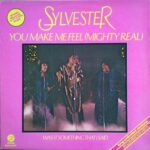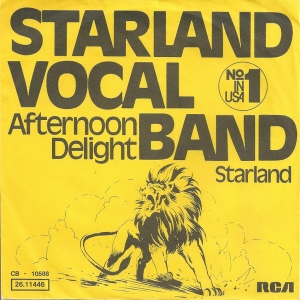 The magic of Sylvester’s “You Make Me Feel (Mighty Real)” didn’t arrive quietly, and it certainly didn’t arrive timidly. When the track premiered in 1978, the disco era was reaching its most flamboyant, fully realized form, but few songs captured the physical electricity and emotional liberation of the dancefloor the way this one did. Before a single lyric is sung, before Sylvester’s unmistakable falsetto rises above the beat, the track already feels alive—like it’s breathing, shimmering, pulsing. It’s more than a song; it’s a personal declaration, a cultural moment, and a sonic shift wrapped into one. “You Make Me Feel (Mighty Real)” remains an anthem because it invites listeners to step into their most honest selves and take up space with pride. That invitation was radical then, and it’s still vital now. The late ’70s were bursting with disco hits, but few—if any—managed to combine emotional soul, queer identity, and dancefloor transcendence with this kind of force.
The magic of Sylvester’s “You Make Me Feel (Mighty Real)” didn’t arrive quietly, and it certainly didn’t arrive timidly. When the track premiered in 1978, the disco era was reaching its most flamboyant, fully realized form, but few songs captured the physical electricity and emotional liberation of the dancefloor the way this one did. Before a single lyric is sung, before Sylvester’s unmistakable falsetto rises above the beat, the track already feels alive—like it’s breathing, shimmering, pulsing. It’s more than a song; it’s a personal declaration, a cultural moment, and a sonic shift wrapped into one. “You Make Me Feel (Mighty Real)” remains an anthem because it invites listeners to step into their most honest selves and take up space with pride. That invitation was radical then, and it’s still vital now. The late ’70s were bursting with disco hits, but few—if any—managed to combine emotional soul, queer identity, and dancefloor transcendence with this kind of force.
At its core, the song is about authenticity. Not the casual, polished kind, but raw authenticity—the kind you fight for, the kind you celebrate. Sylvester’s performance communicates a joyous urgency, as if he’s singing directly to the people who need freedom the most. Even the title captures the emotional charge: feeling “mighty real” isn’t passive. It’s an exhale of relief after holding yourself in for too long. The brilliance of the track is that it fuses that emotional idea with a sound that refuses stillness, built on Patrick Cowley’s groundbreaking synthesizer production. This wasn’t nostalgia in 1978, nor was it safe. It was the sound of the future breaking through. And it arrived through an artist who was uniquely equipped—not just musically but spiritually—to deliver something bold, expansive, and unforgettable.
The Pulse of the Dancefloor
“You Make Me Feel (Mighty Real)” opens with the electronic swirl of Cowley’s synths, creating a foundation that was ahead of its time. Sylvester’s earlier work leaned more toward soul and gospel, but here, he embraced the cutting-edge world of high-energy disco with complete confidence. The arrangement doesn’t build slowly; it drops listeners right into the middle of a neon-lit, sweat-soaked nightclub where bodies move in unison and inhibitions evaporate. The beat is relentless, but never overwhelming. It’s designed to lift, to energize, to erase separation between performer and listener.
Then Sylvester enters. His voice is instantly commanding—not aggressive, but full of presence. His falsetto rings with clarity and emotion, and unlike many disco vocalists who drifted into the background of the mix, he takes center stage. Every note he sings feels intentional. This was a singer who understood drama, who understood that dance music thrives on intensity, who understood that honesty doesn’t have to whisper.
What makes the performance so iconic is that Sylvester delivers the lyrics not as empty dancefloor clichés but as something deeply felt. Lines like “When we’re out there dancing on the floor / I can feel your heart beat, feel your heart beat” strike a balance between intimacy and exuberance. The song celebrates a connection that’s physical, emotional, and liberating all at once. He’s singing to a partner, yes, but he’s also singing to anyone who’s ever found refuge beneath a disco ball.
A Radical Artist Meets a Radical Sound
Sylvester was never just a singer; he was a visionary. Openly queer at a time when mainstream media refused to acknowledge queer identities, he lived with a boldness that made his music even more powerful. “You Make Me Feel (Mighty Real)” blends personal truth with dancefloor ecstasy in a way that resonates with listeners who’ve ever felt out of place in the world. His gender-fluid presentation, reliance on glamour, and refusal to tone himself down were woven directly into the fabric of the song. It sounds extravagant because he was extravagant. It sounds confident because he was confident. It sounds free because he fought for freedom.
Pairing Sylvester with Patrick Cowley was a stroke of genius. Cowley’s electronic production pushed the boundaries of disco, using synthesizers in ways that would influence house and electronic dance music for decades. He turned the beat into something more elastic, futuristic, and propulsive than almost anything else on the scene in 1978. In turn, Sylvester’s voice gave Cowley’s production a soulfulness that kept the track warm rather than coldly mechanical.
Together, they created a sound that still feels contemporary. DJs continue to incorporate the track into sets not because of nostalgia but because it simply works. The energy remains untouchable.
Cultural Power and Queer Liberation
What makes “You Make Me Feel (Mighty Real)” endure is not just its catchiness—though it’s undeniably catchy. It’s the fact that it became a safe space in musical form. For many queer listeners, especially those in the late ’70s, the song represented visibility. It was a moment where disco’s celebration of identity aligned with a fiercely expressive, unapologetically queer artist. The song helped affirm that liberation wasn’t only political or social; it could also be joyful, embodied, and loud.
As the LGBTQ+ community faced discrimination and marginalization, songs like this became sanctuary. Clubs where Sylvester’s music played weren’t just nightlife—they were community hubs, creative spaces, and emotional lifelines. “You Make Me Feel (Mighty Real)” was a soundtrack for those seeking joy in a world that often denied it to them.
Decades later, the song continues to appear in Pride celebrations, queer cinema, and LGBTQ+ cultural archives. It remains a shorthand for empowerment and self-love, its message as relevant today as it was in 1978.
A Voice That Lives Forever
Sylvester’s career ended far too soon—he passed away in 1988 from complications due to AIDS—but his influence has continued to expand. Artists across genres credit him as an inspiration, from electronic musicians to pop stars who embrace flamboyance with pride. “You Make Me Feel (Mighty Real)” alone could have cemented his legacy, but he had an entire catalog that showcased his emotional depth, vocal range, and artistic courage.
Yet this track stands tallest because it encapsulates everything that made him remarkable. The fearlessness. The glamour. The vulnerability. The joy. The sense that music could create a world where everyone felt accepted, even if only for a few minutes on the dancefloor.
Lasting Impact and Eternal Shine
“You Make Me Feel (Mighty Real)” is one of those rare tracks that belongs to every era. It was built for 1978, but not confined to it. The song crosses generations, cultures, and identities because its core message—feeling real, feeling free, feeling alive—is universal. Whether someone hears it in a club, a movie, a Pride parade, or unexpectedly on the radio, the effect is the same: the pulse quickens, the room brightens, and the world feels just a little more open.
It’s a song that encourages listeners to not only dance but to exist boldly. And in a world where authenticity can still feel like a battle, “You Make Me Feel (Mighty Real)” remains a shining reminder of how transformative being yourself can be.
Sylvester didn’t just make a disco classic. He made a masterpiece that radiates courage, joy, and truth—still mighty, still real.


